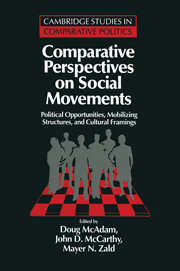 Comparative Perspectives on Social Movements
Comparative Perspectives on Social Movements Book contents
- Frontmatter
- Contents
- Biographical sketches of contributors
- Preface
- Introduction: Opportunities, mobilizing structures, and framing processes – toward a synthetic, comparative perspective on social movements
- PART I POLITICAL OPPORTUNITIES
- PART II MOBILIZING STRUCTURES
- 6 Constraints and opportunities in adopting, adapting, and inventing
- 7 The organizational structure of new social movements in a political context
- 8 The impact of national contexts on social movement structures: A cross-movement and cross-national comparison
- 9 Organizational form as frame: Collective identity and political strategy in the American labor movement, 1880–1920
- 10 The collapse of a social movement: The interplay of mobilizing structures, framing, and political opportunities in the Knights of Labor
- PART III FRAMING PROCESSES
- Notes
- References
- Index
8 - The impact of national contexts on social movement structures: A cross-movement and cross-national comparison
Published online by Cambridge University Press: 05 June 2012
- Frontmatter
- Contents
- Biographical sketches of contributors
- Preface
- Introduction: Opportunities, mobilizing structures, and framing processes – toward a synthetic, comparative perspective on social movements
- PART I POLITICAL OPPORTUNITIES
- PART II MOBILIZING STRUCTURES
- 6 Constraints and opportunities in adopting, adapting, and inventing
- 7 The organizational structure of new social movements in a political context
- 8 The impact of national contexts on social movement structures: A cross-movement and cross-national comparison
- 9 Organizational form as frame: Collective identity and political strategy in the American labor movement, 1880–1920
- 10 The collapse of a social movement: The interplay of mobilizing structures, framing, and political opportunities in the Knights of Labor
- PART III FRAMING PROCESSES
- Notes
- References
- Index
Summary
Political opportunity theorists have mainly dealt with mobilization for protest as the primary dependent variable. Opportunities were clearly assets of their environment and not properties of the protest groups themselves. Thus, the crucial question was: “Which opportunities facilitate or restrict the kind and/or extent of mobilization?” Some authors have treated the level of mobilization (Kriesi, 1989b, 1991; Tarrow, 1989b, 1991b) or the strengths of movements (Rucht, 1995) as the dependent variable. Others focused more specifically on movement strategies (Eisinger, 1973; Kitschelt, 1986), behavior (della Porta and Rucht, 1991), or outcomes (Kitschelt, 1986). Underlying all this work is the explicit or implicit assumption that external opportunities have a direct effect on these dependent variables. However, the literature neglects the role of the structural basis for mobilization. This is surprising, because few social movement scholars doubt that movement networks and organizations have a strong impact on strategies, mobilization, and success.
Resource mobilization theorists have emphasized the role of social movement industries, movement organizations, and movement entrepreneurs in the process of mobilization (Zald and Ash, 1966; McCarthy and Zald, 1977; Zald and McCarthy, 1980). They have not only formulated a variety of hypotheses about these explanatory factors for mobilization as the dependent variable but also demonstrated their weight in many empirical studies. However, not much work in this research tradition analyzes the societal context that may influence social movement organizations (but see Garner and Zald, 1985; McCarthy, Britt, and Wolfson, 1991). As a rule, political opportunity approaches have neglected the structural basis for resource mobilization, whereas resource mobilization approaches have largely ignored the broader political environments in which social movement organizations are embedded.
- Type
- Chapter
- Information
- Comparative Perspectives on Social MovementsPolitical Opportunities, Mobilizing Structures, and Cultural Framings, pp. 185 - 204Publisher: Cambridge University PressPrint publication year: 1996
- 109
- Cited by


